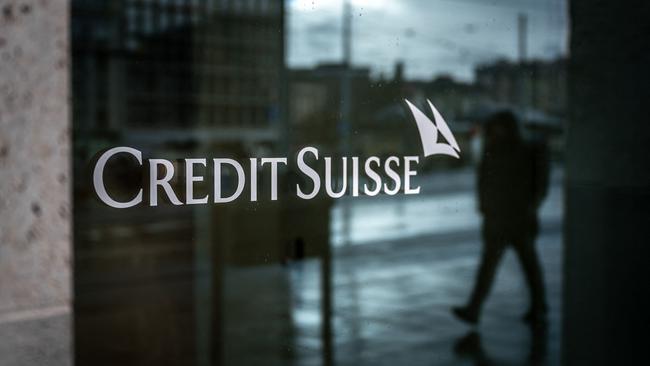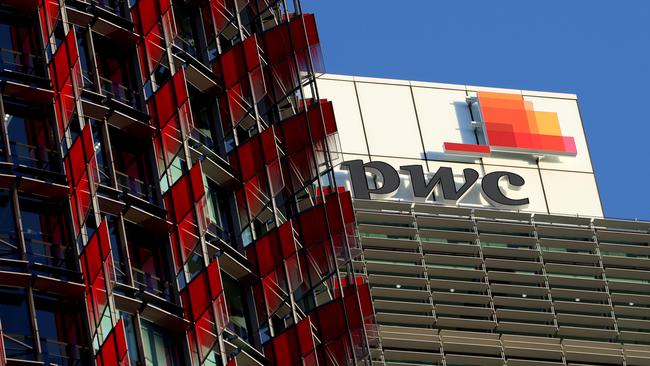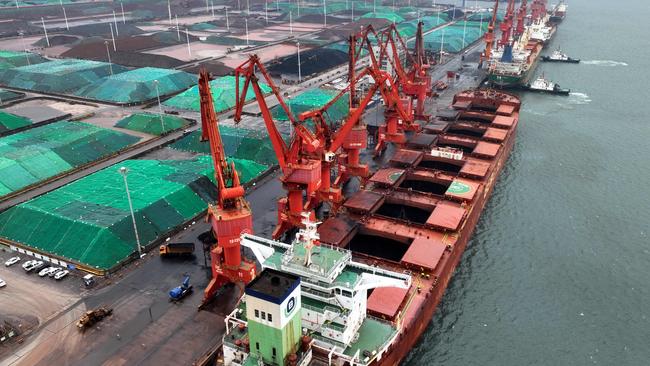Too hard to ignore: The three big business themes flying into 2024
We were taken on a wild ride over the past year but it offered plenty of valuable lessons for business.

Business
Don't miss out on the headlines from Business. Followed categories will be added to My News.
Remember Silicon Valley Bank? With Wall Street topping out at a record high this week, not many do.
Credit Suisse is another name that threatened to go off like a financial bomb around the world back in March. The Swiss investment bank – and its branding that once towered over Sydney’s Circular Quay – is now largely forgotten. New owner UBS has a job to untangle it all, but any pain has been eased by its near-60 per cent share rally since the deal was struck.
If anything the past year has shown that market sentiment moves on a dime. Be careful about the direction the pack is running in and always keep an open mind.
The bond market slump of September and early October set alarm bells ringing loudly; the financial world was very much facing a hard landing. This bond crash came on the heels of dire predictions in March of a deep regional banking crisis to follow the collapse of SVB.
Fast-forward to the end of 2023, and US shares have staged a monster double-digit rally that has taken the rest of the world along with it.

Today, it’s the prospect of multiple US rate cuts and a soft landing that represents the latest bullish bet. Apart from the blip this week, the positive outlook has been driving US shares and the “Magnificent Seven” tech stocks to record levels.
At this time a year ago, the market consensus had interest rates in Australia topping out at around 3.5 per cent, and it was highly probable we’d be in the grip of a recession by now.
Property prices too were forecast to fall hard, with losses as high as 20 per cent from the peak. Meanwhile, banks were bracing for the “mortgage cliff”, with heavy losses looming as billions of dollars worth of home loans reset at a higher interest rate. Neither prediction on housing or banks has played out, nor has the recession call. The Australian economy has held its ground going into the new year and is likely to avoid a recession. Even as Australia’s cash rate is sitting at a higher-than-expected 4.35 per cent, national house prices are up 7 per cent, led by Sydney at 10.2 per cent.

For global markets, the turning point was the stunning retreat of bond yields from the middle of October with the US Federal Reserve shifting ground on the rates outlook. After fearing the worst, investors are now pencilling in multiple US rate cuts next year as inflation eases. Even futures markets in Australia are tipping rates to start falling here from July.
On Thursday closely watched Commonwealth Bank economist Stephen Halmarick said he now expected the RBA to cut the cash rate by 75 basis points from September. He expects another 75 basis points of cuts to follow into early 2025. In other words, that’s a landing covered in cotton wool.
This low-rate sentiment has been powering equity market returns, with tech stocks in particular taking off. For what was shaping up to be a pretty ordinary year for shares, Australia’s benchmark S&P/ASX 200 index is up 10.2 per cent since the end of October. Wall Street’s S&P 500 has been up almost 16 per cent in past two months, while the Nasdaq was up more than 19 per cent.
Things look good now, but remember, markets have an enduring capacity to surprise. Today’s sure bet is not always the right bet.
The big risk going into next year is that the rate-cut story doesn’t materialise. If interest rates stay higher for longer, this will have a major impact on corporate earnings, particularly if consumer spending slowdown is deeper. This week’s profit warning from retailer KMD Brands, owner of Kathmandu, Rip Curl and Oboz shows consumers are still feeling the pinch heading into Christmas. The pain trade isn’t over just yet.
Reputation
For companies, the top lesson of the past year is that reputation matters more than ever. Two of the biggest business stories of the year – PwC and Qantas – show what happens when reputation is ignored. Both companies have been reeling from their own-goals and both face a hard road back.
As the chairman of one of Australia’s biggest companies tells The Australian: “Reputation goes down using the elevator but up by taking the stairs”. And Mirvac chief executive Campbell Hanan speaks for many in the The Australian’s 2024 CEO Survey: “There is an awareness around the value of trust – trust is what will give businesses the social licence to keep operating successfully into the future.”

PwC faced a series of damning revelations from a Senate inquiry around the misuse of confidential information by tax partner Peter Collins, and the audit firm faces real questions around its future viability in the local market.
Fallout from the scandal has meant PwC has been forced to cut its lucrative government consulting arm. PwC too has seen a top-level clean-out of partners and a loss of corporate business. Damage from the scandal continues to play out for the accounting firm.
Qantas rapidly went from market hero to zero after its reputational hits kept mounting. A record cash profit of $2.47bn and the extension of a $500m share buyback couldn’t save former boss Alan Joyce. Days after the profit result, the competition regulator lobbed its now famous “ghost flight” legal action. Qantas is defending the claim it deliberately sold tickets for flights it had already cancelled. Had Qantas valued its reputation going into the ACCC action, Joyce might have survived. But the delays, lost luggage and years of undercooking investment to please shareholders all added up.

Compounding this was a High Court ruling weeks later that found Qantas had illegally sacked staff that had been stood down during the Covid pandemic. Joyce was already gone but Qantas chair Richard Goyder was next in line, seen as too close to the former airline boss. Goyder will pay the price with an earlier retirement this year and two directors have committed to stand down in February. Investors had the final word on reputation after Qantas copped a massive 83 per cent rejection of its remuneration report during its annual meeting.
Optus too faces a longer-term reputation rebuild after its daylong outage in November. It was the second botched customer and political response to a major incident in a short period. A cyber attack a year earlier in which the private details of millions were stolen had already put the telco offside with customers. Few CEOs come through one major reputational hit unscathed, and Optus chief executive Kelly Bayer Rosmarin had two. She resigned shortly after the outage and Optus parent Singtel is now determined to install a long-term telco executive as her replacement.
China
Finally, it feels almost too obvious, but there’s a constant reminder never to ignore China. Even with the rest of the world in recovery, Australia’s fortunes will ultimately rise and fall on the world’s second-biggest economy and our biggest trading partner.
High hopes of a strong reopening for China coming out of Covid faded away by the middle of the year, with the country grappling with a weak property market and local government finances in poor health.

Chinese authorities are aware of the longer term challenges the economy faces. Beijing is shortly expected to confirm an unambitious growth target of 5 per cent for the coming year, matching this year’s 5 per cent, and there will be a commitment to support the economy in getting there. If global growth picks up, expect more upside as the world consumes more Chinese goods.
Despite China’s slowdown this year, underlying economic strength remains. Iron ore is in demand and only briefly dipped below $US100 a tonne this year, with spot prices recovering in recent months to around $US134.
The electrification of China is behind the furious battle in lithium, with Gina Rinehart looking to put a big stake in the ground around local production. Hydrogen is another area of interest for China with Fortescue’s Andrew Forrest willing to help. China’s influence on Australia and the politics that come with it, will play out over decades.
johnstone@theaustralian.com.au
More Coverage
Originally published as Too hard to ignore: The three big business themes flying into 2024





